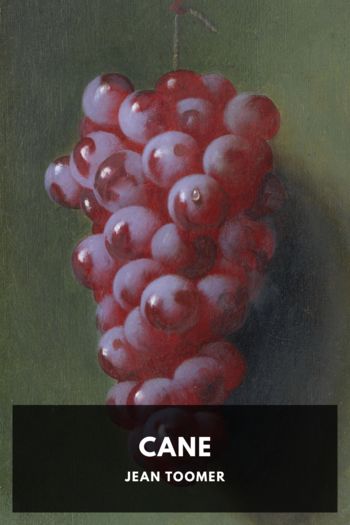Cane, Jean Toomer [best ereader under 100 .TXT] 📗

- Author: Jean Toomer
Book online «Cane, Jean Toomer [best ereader under 100 .TXT] 📗». Author Jean Toomer
By Jean Toomer.
This ebook is the product of many hours of hard work by volunteers for Standard Ebooks, and builds on the hard work of other literature lovers made possible by the public domain.
This particular ebook is based on a transcription produced for Project Gutenberg and on digital scans available at the HathiTrust Digital Library.
The writing and artwork within are believed to be in the U.S. public domain, and Standard Ebooks releases this ebook edition under the terms in the CC0 1.0 Universal Public Domain Dedication. For full license information, see the Uncopyright at the end of this ebook.
Standard Ebooks is a volunteer-driven project that produces ebook editions of public domain literature using modern typography, technology, and editorial standards, and distributes them free of cost. You can download this and other ebooks carefully produced for true book lovers at standardebooks.org.
To my grandmother …
Oracular.
Redolent of fermenting syrup,
Purple of the dusk,
Deep-rooted cane.
Reading this book, I had the vision of a land, heretofore sunk in the mists of muteness, suddenly rising up into the eminence of song. Innumerable books have been written about the South; some good books have been written in the South. This book is the South. I do not mean that Cane covers the South or is the South’s full voice. Merely this: a poet has arisen among our American youth who has known how to turn the essences and materials of his Southland into the essences and materials of literature. A poet has arisen in that land who writes, not as a Southerner, not as a rebel against Southerners, not as a Negro, not as apologist or priest or critic: who writes as a poet. The fashioning of beauty is ever foremost in his inspiration: not forcedly but simply, and because these ultimate aspects of his world are to him more real than all its specific problems. He has made songs and lovely stories of his land … not of its yesterday, but of its immediate life. And that has been enough.
How rare this is will be clear to those who have followed with concern the struggle of the South toward literary expression, and the particular trial of that portion of its folk whose skin is dark. The gifted Negro has been too often thwarted from becoming a poet because his world was forever forcing him to recollect that he was a Negro. The artist must lose such lesser identities in the great well of life. The English poet is not forever protesting and recalling that he is English. It is so natural and easy for him to be English that he can sing as a man. The French novelist is not forever noting: “This is French.” It is so atmospheric for him to be French, that he can devote himself to saying: “This is human.” This is an imperative condition for the creating of deep art. The whole will and mind of the creator must go below the surfaces of race. And this has been an almost impossible condition for the American Negro to achieve, forced every moment of his life into a specific and superficial plane of consciousness.
The first negative significance of Cane is that this so natural and restrictive state of mind is completely lacking. For Toomer, the Southland is not a problem to be solved; it is a field of loveliness to be sung: the Georgia Negro is not a downtrodden soul to be uplifted; he is material for gorgeous painting: the segregated self-conscious brown belt of Washington is not a topic to be discussed and exposed; it is a subject of beauty and of drama, worthy of creation in literary form.
It seems to me, therefore, that this is a first book in more ways than one. It is a harbinger of the South’s literary maturity: of its emergence from the obsession put upon its minds by the unending racial crisis—an obsession from which writers have made their indirect escape through sentimentalism, exoticism, polemic, “problem” fiction, and moral melodrama. It marks the dawn of direct and unafraid creation. And, as the initial work of a man of twenty-seven, it is the harbinger of a literary force of whose incalculable future I believe no reader of this book will be in doubt.
How typical is Cane of the South’s still virgin soil and of its pressing seeds! and the book’s chaos of verse, tale, drama, its rhythmic rolling shift from lyrism to narrative, from mystery to intimate pathos! But read the book through and you will see a complex and significant form take substance from its chaos. Part One is the primitive and evanescent black world of Georgia. Part Two is the threshing and suffering brown world of Washington, lifted by opportunity and contact into the anguish of self-conscious struggle. Part Three is Georgia again … the invasion into this black womb of the ferment seed: the neurotic, educated, spiritually stirring Negro. As a broad form this is superb, and the very looseness and unexpected waves of the book’s parts make Cane still more South, still more of an aesthetic equivalent of the land.
What a land it is! What an Aeschylean beauty to its fateful





Comments (0)